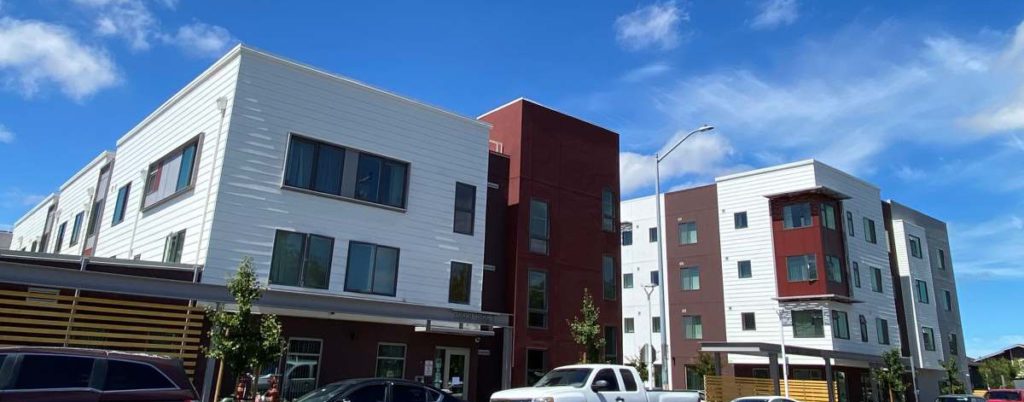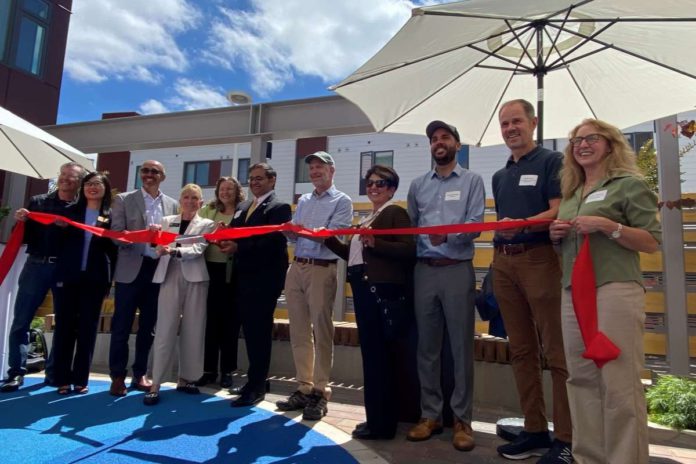According to Dan Sawislak, executive director of Resources for Community Development (RCD), the former Islander Motel with its 1970s architecture looked like “something that would be in a ghost movie.” Now with a new identity as Bell Street Gardens—one of five affordable housing projects in Fremont with a 2025 opening date—the place is full of life.
The former motel first joined Project Roomkey during Covid, helping 159 residents find interim housing. The Bell Street Gardens project to renovate the motel and construct a new building broke ground in October 2023 with RCD as the developer.
The City of Fremont gave a total of $13 million toward the project, 10 million from the city’s affordable housing fund (which comes out of fees from market rate housing). According to a 2022 document from the County of Alameda, the entire project came out to over 100 million.
Fremont Mayor Raj Salwan spoke at the opening. “When I was growing up here in the city of Fremont…I remember passing by the old Islander Motel. It was a place that many people avoided. It was known for frequent calls for police service, had ongoing problems and was a source of nuisance and blight.”
Gustavo Velasquez, director of California Department of Housing and Community Development, talked about the roadblocks to getting new housing built in a state where projects can be shot down or remain stuck in red-tape limbo. “We’re fortunate to have ‘yes-sayers’ in this city. There’s so many places throughout the state of California where there are a lot of naysayers. But we do act to ensure that the state has laws in place that sometimes help, sometimes force localities to do the right thing by approving housing faster.”
Apart from one unit left vacant for viewing, the complex is fully leased. Getting into an affordable complex isn’t easy: RCD’s website details which buildings have open applications, and after applying approved residents join a waitlist.
Bell Street Gardens has designated parking, a gym, courtyards, communal laundry facilities, mailboxes and outdoor spaces. Of the 126 units (not counting two manager’s units), only 24 are two-bedroom (at 845 square feet) and 12 are three-bedroom. So there are fewer options for larger families.

Devoid of carpeting and for the day lacking the usual bustle of residents coming and going, the hallways felt a bit sterile, although prints of iconic East Bay scenes livened up the atmosphere. The first floor unit open for viewing also lacked carpeting, but did have a robust kitchen area with a good amount of cabinet and counter space in addition to a refrigerator, oven and stove.
There is a feeling that ideally, Bell Street will act as a more stable form of transitional housing (17 units are designated for formerly homeless residents), with the expectation of more frequent deep cleaning of units between residents than for typical apartments.
A possible issue is the lack of a crosswalk for the six-lane Mowry Avenue, between the complex and the Hub shopping center. Currently, residents need to walk one block up to cross safely at Fremont Boulevard.
For Fremont, next up for affordable housing are the Osgood North and Osgood South complexes and Serra Apartments. (Fremont Family Apartments opened in May.)
Fittingly, the night before the Bell Street Gardens opening, the Alameda County Board of Supervisors were deciding how to use $810 million from Measure W funding, opting to use 80% to address homelessness.
Velasquez noted, “I always say when I travel throughout the state, [once affordable housing is] done, it just changes the nature of the community. For all the people who are saying ‘No! No low income housing in my community!’ these projects are catalytic to restore, to improve the community. Not the other way around.”




